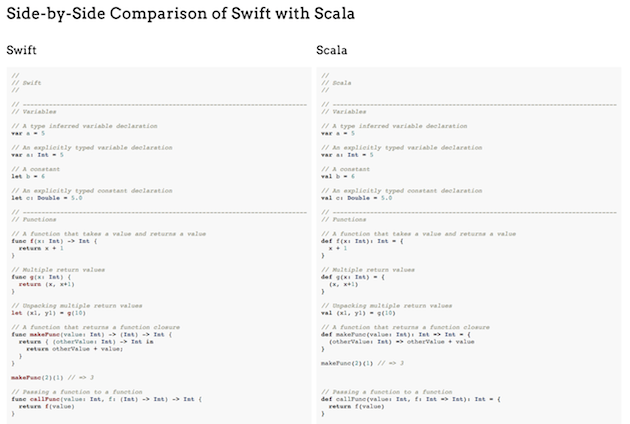Swift is a modern multi-paradigm programming language that shares some convenient features already available in other current generation languages. My personal feeling is that Scala has had a heavy influence on its design. In this post I want to explore the similarities and differences to see how true this may be.
I was lucky enough to attend Daniel Steinberg's excellent Swift Tutorial at NSScotland 2014. It was very good and covered the basics thoroughly. I would recommend attending one if he is teaching near you.
I felt immediately at home with Swift. Almost every language feature introduced felt familiar because it felt and often looked just like equivalent features in Scala. Superficially, it seemed like Swift was basically some good bits of Scala brought to a compile-to-native language for Mac/iOS.
This is of course a bit subjective. Unsurprisingly, while talking to fellow tutorial attendees in the breaks everyone had similar feelings but cited different languages. I heard people say Google’s Go, JavaScript or C# were most similar to them.
My nerdy curiosity was sufficiently piqued that I felt I wanted to compare some syntax side-by-side. So I did (if anything to prevent anyone else having to carry out this geeky activity), enjoy, you’re welcome. So far only Scala is compared, but a Go comparison is under development and I think C# is worth a look too.
So, other than the obvious difference that Scala runs on the JVM and Swift compiles to native code, how do they compare? Click the image below to access the side-by-side comparison:
 Side-by-Side Comparison of Swift to Scala
Side-by-Side Comparison of Swift to Scala
Similarities:
- Static typing with type inference.
- Similar variable/constant declaration syntax, with the type annotation occurring after the variable name.
- No need for semi-colons to terminate statements.
- Function declarations are structurally similar — with the return type being stated after the parameters - but differ in exact syntax.
- First-class / higher-order functions, closures and a block syntax.
- Functions are able to return multiple values.
- Functions can have named, default and variadic parameters.
- Both borrow the sensible
idea that overriding methods in subclasses must be done explicitly using the
overridekeyword. - “For-each” style
forloop for iterating over sequences. - Ranges for easy definition of sequences.
- Both support functional sequence
enumeration using
map,reduce,filter. However Swift stops short of implementingflatMap,foldRight,foldLeftand so on. - Safe
casestatements with no implicit fallthrough - Both feature pattern matching using switch/case style control flow, although Scala’s goes a bit deeper.
- Both use the monadic Optional pattern to deal more explicitly with the possibility of non-existent values. In particular both use it for the return value of lookups in dictionary/map types.
- Tuples.
- Generics.
- Operator overloading with custom infix and prefix operators.
- Attributes/annotations on types and declarations.
- Both support enumeration types.
- Both can be run like scripting languages, both have REPLs, yet both compile if required.
Differences:
- Their class definition syntax is quite different.
- In addition to pass-by-reference
classtypes, Swift has a pass-by-valuestructtype like C/C++/C#. Scala only has the former. - Swift supports external parameter names for functions, which differ from the parameter names inside the function.
- Scala includes a sequence comprehension syntax.
- Scala has implicit returns, Swift doesn’t. Shame.
- Scala supports lazy evaluation
- Swift uses “extensions” to add additional behaviour to existing classes, whereas Scala uses Traits and mixins.
Neither of the above are exhaustive, but I hope the points worth noting are included. So it looks like there are a lot of common features, sometimes with no more than syntactic differences. So what do you think, is Scala the major influence I feel it is?